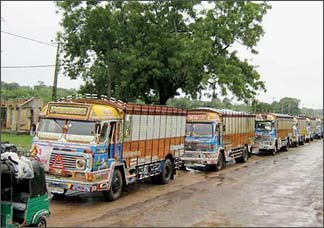|
Prices of essential commodities to drop sharply in
North:
Private lorries to ply on A-9 highway
by P. Krishnaswamy
The Kandy-Jaffna A-9 highway will be opened for the first time in
several years. Private traders will be permitted to operate their
lorries and other convoys to the Northern peninsula from Thursday, a
well-informed Government source said.
 Up to now only State-owned vehicles were operating services on the
A-9 highway transporting food, medicines and other essential items to
the North. With this new arrangement, the prices of essential
commodities are likely to come down sharply in the North. Up to now only State-owned vehicles were operating services on the
A-9 highway transporting food, medicines and other essential items to
the North. With this new arrangement, the prices of essential
commodities are likely to come down sharply in the North.
There are about 300 private lorries registered with Government
authorities to operate services to the North. These lorries will be
checked by the security authorities before setting out and a certificate
will also be issued.
Transport will be permitted between 6 am and 6 pm and the crew of the
lorries will be cautioned that in case the vehicle breaks down they must
keep away from areas bordering the roadsides which may be mined, the
sources said.
Public transport conveyances and other private vehicles will be
permitted to use the highway in due course after ensuring their complete
safety from landmines and other security hazards, the sources also told
the Sunday Observer.
Meanwhile, National Co-ordinator of Disaster Preparedness and
Response Unit (DPRU) of the Health Ministry Dr. Eeshara Kottegoda told
the Sunday Observer that the special operational room of the DPRU set up
in March this year was functioning round-the-clock in the Health
Ministry with three permanent medical officers, four other officials and
three temporary medical officers to provide medical supplies and handle
emergency health situations, especially relating to the IDPs, Dr.
Kottegoda said. The Health Co-ordinating Centre at the Menikfarm Welfare
village is functioning with a staff of about 300 including doctors,
nurses, public health inspectors and others.
This and other facilities including Referral Centres and Primary
Health Care Centres separately for each Welfare Village can handle the
health requirements of over 170,000 IDPs and more such facilities are in
the pipeline, he said.
Each of the four zones (welfare villages) has one Referral Centre and
several Primary Health Care centres.
The Referral Centres have all medical equipment and facilities
including OPD, clinic, laboratory, immunization and other facilities
that are normally available in any Government hospital while the Primary
Health Centres are functioning as Government dispensaries from dawn to
dusk providing healthcare to the IDPs. Two more Primary Health Care
Centres are under construction, he said.
There are problems relating to the supply of adequate water, garbage
disposal and sanitation but the authorities concerned are working in
co-ordination with the Health Ministry to address them, Dr. Kottegoda
said.
|

